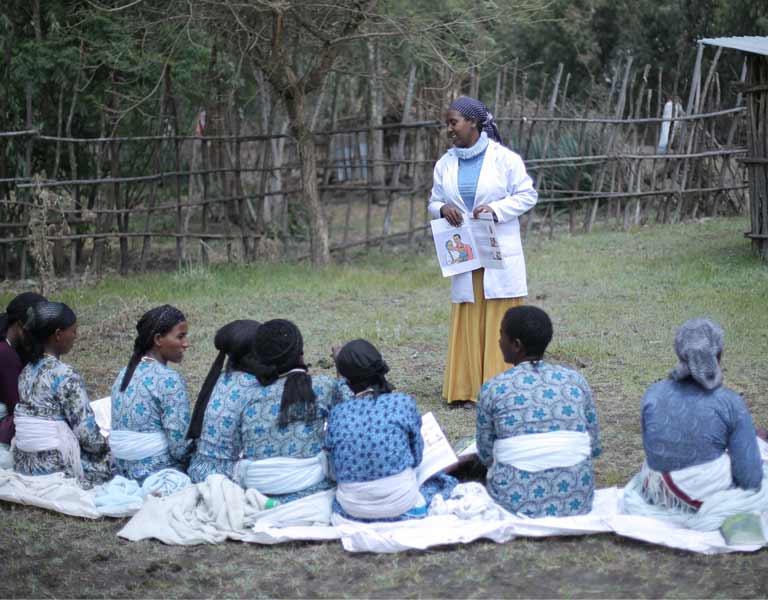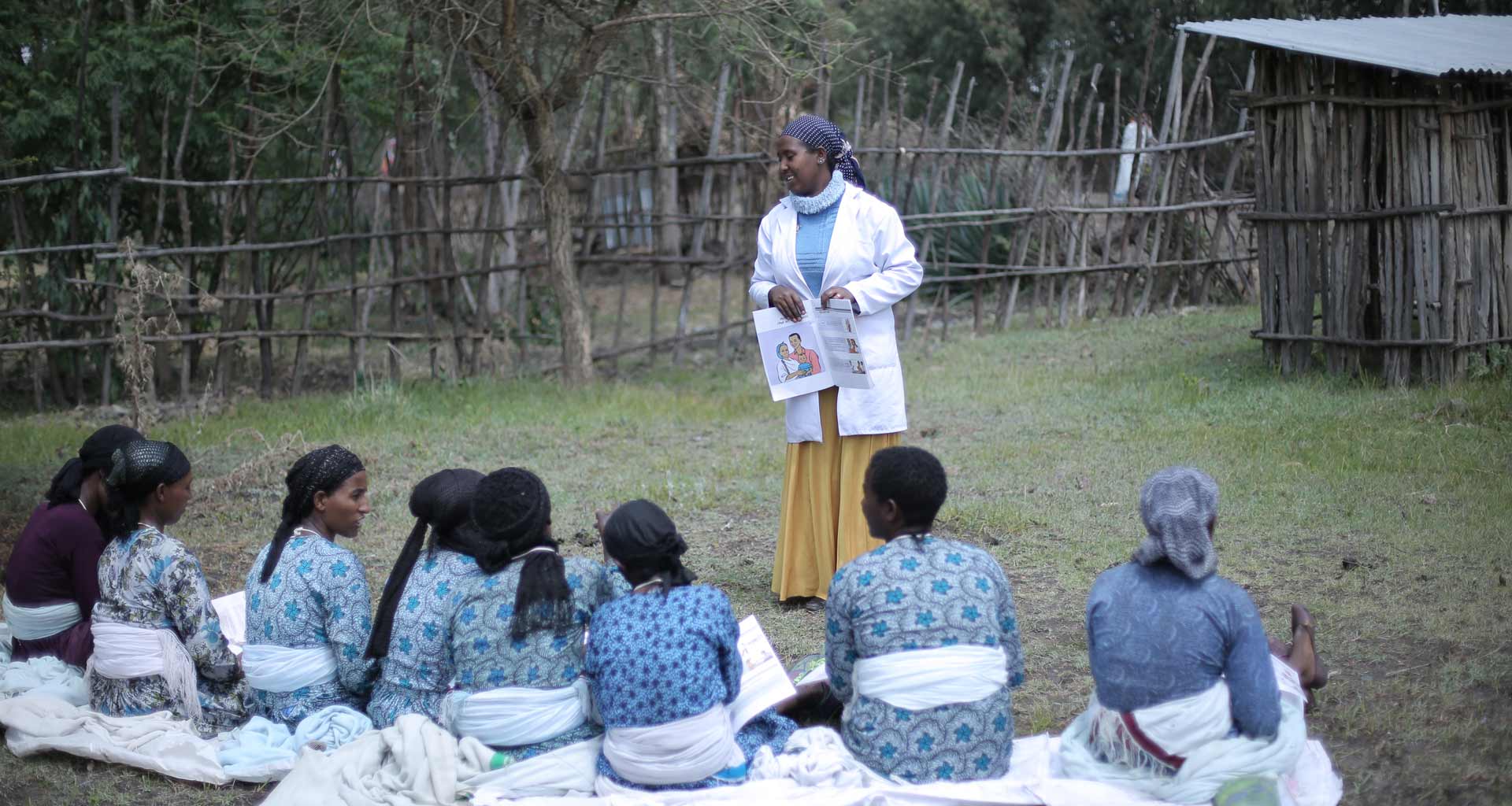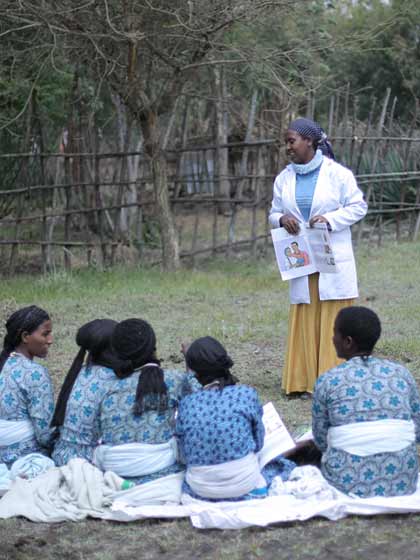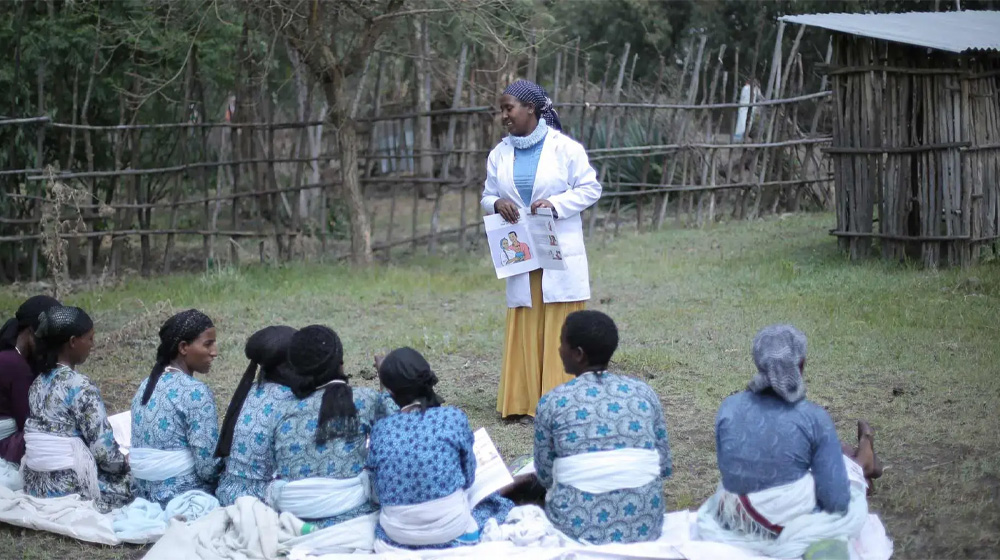Comprehensive sexuality education helps young people to learn about the emotional, physical and social aspects of sexuality, providing them with the knowledge to protect and advocate for their health, well-being and dignity. It includes information about healthy relationships and sexual and reproductive health and rights, relevant to people’s age and culture.
Having access to comprehensive sexuality education supports young people to make informed choices, exercise self-care and achieve bodily autonomy – which are prerequisites for upholding human rights and reaching gender equality.
Yet too many young people enter adulthood with inaccurate, incomplete or conflicting information about sexual and reproductive health, leaving them vulnerable to unintended pregnancy, sexually transmitted infections, violence and coercion.
By investing in young people’s health and education, governments can support their engagement in society and help them achieve their full potential. Young leaders are spreading the word as well: During the ICPD30 Global Youth Dialogue, they underscored the need for quality sexuality education that is delivered by trained educators, adheres to international standards and reflects the sexual realities of a changing world.
Comprehensive sexuality education can be taught in school as a part of the curriculum, in community-based settings and through digital platforms. It is most effective when taught over several years, integrating age-appropriate information and relaying scientifically accurate information about anatomy, contraception, childbirth, sexually transmitted infections, and the prevention of gender-based violence. Young people can also be encouraged to explore their sexual and reproductive health and rights through discussions about gender equality, family life, relationships, culture and bodily autonomy. This helps them to develop self-esteem and life skills such as critical thinking, clear communication, responsible decision making and respectful and empathetic behaviour.
Comprehensive sexuality education recognizes the diverse needs of young people and takes into consideration their age, race, class, gender and sexual experience. It also accounts for whether they live in urban or rural areas or are from marginalized and vulnerable groups – such as those with disabilities, young people from LGBTQIA+ communities, those in humanitarian settings, indigenous and geographically isolated young people, and those living with HIV.
UNFPA’s leadership
Having young people realize their full potential remains central to UNFPA’s mandate, and the Agency works to empower young people to shape the lives they want. Comprehensive sexuality education is a key component of UNFPA’s global strategy for adolescents and youth and contributes to the achievement of the UNFPA Strategic Plan and Transformative Results.
For decades, UNFPA has been working with governments, regional entities, civil society organizations and implementing partners to establish and evaluate comprehensive sexuality education programmes in both the formal education sector and community-based settings. This includes:
- Co-creating international standards and guidance and supporting the institutionalization of comprehensive sexuality education in national systems;
- Advocating for legal and policy developments that promote environments conducive to implementing comprehensive sexuality education programmes;
- Convening global networks, broadening partnerships and facilitating youth-led platforms aimed at creating universal access to comprehensive sexuality education;
- Building the capacity of teachers, facilitators, youth leaders and other stakeholders through pre-service and in-service training;
- Ensuring coherence and alignment of national curricula to international standards;
- Developing teaching and learning materials such as facilitator manuals, videos, apps and scripted lesson plans with quality-assured content and methodologies;
- Ensuring that all social media and digital platforms related to comprehensive sexuality education are safe and provide vetted content;
- Contributing to the evidence base on the impact of comprehensive sexuality education;
- And ensuring that referral mechanisms are strengthened for sexual and reproductive health and gender-based violence protection services.
Featured global programmes
Reaching the furthest behind first
UNFPA has been implementing a global programme for out-of-school comprehensive sexuality education since 2019, targeting left-behind young people. In the Republic of Moldova, UNFPA is working with the government and partners to deliver comprehensive sexuality education to Ukrainian refugees, with sessions on life skills and resilience building, mental health counselling and sexual and reproductive health referrals and information. In Malawi, UNFPA has specific programmes for young people living with HIV, identifying and training facilitators from the same community. And in the Occupied Palestinian Territory, UNFPA has developed a digital platform for sexual education, which is accessible to young people with hearing impairments and visual disabilities.
In 2020, UNFPA and partners (UNAIDS, UNESCO, UNICEF, WHO) launched the International Technical and Programmatic Guidance on Out-of-School Comprehensive Sexuality Education, which provides evidence-based, human rights–centred guidelines for reaching the most vulnerable young people. Out-of-school programmes often include community-based training and education, and may focus on groups such as young people with disabilities, young indigenous people, LGBTQIA+ youth, young people living with HIV or those in humanitarian settings.
UNFPA also co-convenes the Global Partnership Forum on Comprehensive Sexuality Education with UNESCO, aiming to advance research, promote good practices, enhance collaboration and overcome challenges. Members include UN agencies, funding agencies, international civil society organizations working in sexual and reproductive health and rights, youth-led organizations, research and academic institutions, as well as educational and other professional networks.
With other UN partners, UNFPA co-authored the stock-taking Global Status Report on Comprehensive Sexuality Education and is building evidence on comprehensive sexuality education. In May 2023, a special edition of the journal Sexual and Reproductive Health Matters, titled “Learning beyond the classroom: Comprehensive sexuality education for outside-of-school settings”, shared implementation research from Colombia, Ethiopia, Ghana and Malawi.
Expanding and improving access
UNFPA’s most recent global initiative, EmpowerED, seeks to increase access to comprehensive sexuality education in and out of school, enhance young people’s sexual and reproductive health and rights, and help them achieve full bodily autonomy and a life free from violence.
EmpowerED has a particular focus on addressing gender inequality and preventing gender-based violence. It is designed following the principles of youth leadership and leaving no one behind, and explicitly adopts gender-transformative, survivor-centred and trauma-informed approaches.
The initiative focuses on the following 10 countries across all six UNFPA regions: Argentina, Colombia (Latin America and the Caribbean); Benin, Ghana (West and Central Africa); Ethiopia, Malawi, Zambia (East and Southern Africa); the Republic of Moldova (Eastern Europe and Central Asia); the Philippines (Asia and the Pacific) and Tunisia (Arab States).
The programme employs three main strategies:
1- Increase the availability, accessibility and quality of comprehensive sexuality education content and delivery through traditional and digital channels
2- Accelerate the scale-up of programmes in the 10 focus countries and foster links to sexual and reproductive health and gender-based violence protection services
3- Leverage civil society networks and partnerships for advocacy, knowledge generation and technical collaboration on comprehensive sexuality education
Beneficiaries include 7.5 million young people, educators, service providers, civil society organizations and governments.
Qualities of CSE
According to the UN International technical guidance on sexuality education, it should be:
- Scientifically accurate
- Incremental
- Age and developmentally appropriate
- Curriculum based
- Comprehensive
- Based on a human rights approach
- Based on gender equality
- Culturally relevant and context appropriate
- Transformative
- Able to help develop life skills needed to support healthy choices
There are eight key concepts, outlined in the chart below, which are equally important and intended to be taught alongside one another. Topics are repeated with increasing complexity, building on previous learning.
Comprehensive sexuality education may go by other names – such as life skills, holistic sexuality education, family life education, sex ed, HIV education and, more recently, education for health and well-being. No matter what it’s called, comprehensive sexuality education aims to empower all young people to know, demand and protect their rights to the information and services central to their health and well-being.
The importance of sexuality education has been recognized by numerous international agreements, including the 2030 Agenda for Sustainable Development and the Political Declaration on HIV and AIDS.
Updated 10 September 2025



